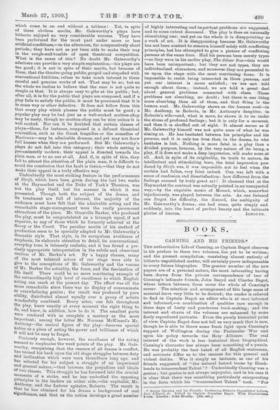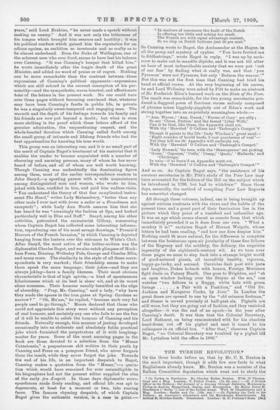BOOKS.
CANNING AND HIS FRIENDS.*
THE authoritative Life of Canning, as Captain Begot observes in his preface to these two volumes, has yet to be written; and the present compilation, consisting almost entirely of hitherto unpublished matter, will certainly prove indispensable to every future biographer. The greater number of the new papers are of a personal nature, the most interesting having been drawn from the private correspondence of two of Canning's intimate friends, John Sneyd and Charles Begot, whose letters between them cover the whole of Canning's career. The selection and arrangement of this large mass of material leave very little to be desired; the reader ii relieved to find in Captain Begot an editor who is at Once informal and informed,—a combination of qualities rare enough in these days of hasty and ponderous book-making; and the interest and charm of the volumes are enhanced by some finely reproduced portraits. From the purely historical point of view, Captain Begot does not tell us very much that is new, though he is able to throw some fresh light upon Canning's support of Wellington during the Peninsular War and upon his policy towards the Holy Alliance. The real interest of the work is less historical than biographical. Canning's character has always been something of a puzzle. He was probably the best hated of all English .statesmen, and accounts differ as to the reasons for this general and violent dislike. Was it simply an instance, as one of his friends suggested, of "the natural hatred borne by Block- heads to transcendent Talent" P Undoubtedly Canning was genius ; but genius is not always unpopular, and in his case it is clear that there was something particularly, exasperating in the form which his " transcendent Talent" took. "For * George Canning and his Friends : Containing Hitherto Unpublished Letters. Year d'Eoprit, &a. Edited by Captain Joseeline Bagot. With illustration. 2 vols. London : John Murray. Ens. net.]
years," said Lord Erskine, "be never made a speech without Making an enemy." And it was not only the bitterness of his tongue which brought him censure and hostility ; it was his political conduct which gained him the reputation for an odious egoism, an ambition so inveterate and so crafty as to be almost underhand. Even the Duke of Wellington, one of the soberest men who ever lived, seems to have lost his balance over Canning. "It was Canning's temper that killed him," he wrote immediately after the tragic death of the great Minister, and added no word of praise or of regret. Nothing can be more remarkable than the contrast between 'these expressions of Canning's political opponents—expressions which are still echoed in the current conception of his per- eonality—and the sympathetic, warm-hearted, and affectionate tone of the letters in the present work. No one could turn .over these pages without becoming convinced that, whatever may have been Canning's faults in public life, in private be was a singularly sweet-tempered and engaging man. The warmth and the depth of his feelings towards his family and his friends are now put beyond a doubt; but what is even more striking is the proof which these letters afford of the genuine admiration, the unquestioning rempect, and the whole-hearted devotion which Canning called forth among the small group Of intimate and lifelong friends who had the best opportunities for knowing his true worth. .
This group was an interesting one, and it is no small part of the merit of Captain Bagot's treatment of his material that it enables the reader to become acquainted with a number of charming and amusing persons, many of whom he has never heard of before, and all of whom are well worth knowing. Though Canning was undoubtedly the dominating figure among them, most of the earlier correspondence centres in John Sneyd,—a sporting parson with a wide acquaintance among distinguished men and women, who wrote to him, joked with him, confided in him, and paid him endless visits. " You understand the theory of that fine complicated instru- ment The Heart," writes Lady Malmesbuty, "better than any other male I ever met with (even a sailor or a Frenchman not excepted)"; while Lady Ann North assures him that she has heard be was "amazingly the fashion at Spa, and looked particularly well in Blue and Buff." Sneyd, among his other activities, patronised the caricaturist Gillray, concerning whom Captain Begot has collected some interesting informa- tion, reproducing one of his most savage drawings, " Prornie'd Horrors of the French t Invasion," in which Canning is depicted hanging from the lantern over the entrance to White's Club. After Sneyd, the most active of the lettter-writers was the diplomatist Charles Begot, and we also catch glimpses of Hook- ham Frere, Binning, Wellesley Pole, George and Charles Ellis, and many more. The similarity in the style of all these corre- spondents is very marked ; their friendship seems to make them speak the same language; their jokes—and they are always joking—have a family likeness. Their most obvious eltaracteristie is that of high spirits,—a kind of spontaneous hilariousness which at its beet is sheer wit, and at its worst sheer nonsense. Their humour usually trembled on the edge of absurdity. "Pray, Mr. Canning," said a lady, "why have they made the spaces in the iron gates at Spring Gardens so narrow ? " "Oh, Ma'am," he replied, "because such very fat people used to go through." Moore declared that those Who could not appreciate this story were without any perception of real humour, and certainly any one who fails to see the fun of it will be unable to relish the humour of Canning and his friends. Naturally enough, this manner of jesting developed occasionally into an elaborate and absolutely futile practical joke which furnished the perpetrators of it with laughing- nuttter for years. Some of the most amusing pages in the book are those devoted to a selection from the "Masse Cateatoneis," a preposterous skit written in their youth by Canning and Frere on a pompous friend, who never forgave
them the insult, while they never forgot the joke. Towards the end of his life, in an important despatch to Begot, Canning makes a quotation from the " Musae,"—a quota- tion which would have remained for ever unintelligible to his biographers had not the present editor supplied the clue
of the early jou cresprit. In those days diplomatic corre-
spondences made lively reading, and official Maras apt to degenerate, at least for a moment or two, into roaring farce. The famous rhyming despatch, of which Captain Begot gives the authentic version, is a case in point ;— "In matters of commerce the fault of the Dutch Is offering too little and asking too much. The French are with equal advantage content, So we clap on Dutch bottoms just 20 per cent."
So Canning wrote to Begot, the Ambassador at the Hague, in all the pomp and mystery of cypher. "You have fretted me to fiddlestrings," wrote Begot in reply. "I was up by cock-
crow to make out la maudite depgehe, and it was not till after an hour of most indescribable anxiety that we were put ' out of our fear' by finding what it really was, and that you Pyramus' were nob Pyramus, but only Bottom the weaver.' But this was not the first time that Canning had tried his hand at official verses. At the very beginning of his career, he and Lord Wellesley were asked by Pitt to make an abstract of Sir Frederick Eden's learned work on the State of the Poor. The result was remarkable, for the two young secretaries pro- duced a doggerel poem of fourteen verses entirely composed of phrases taken higgledy-piggledy out of Eden's work and strung together into an exquisitely meaningless whole :-- "Ann. Waver.,"Ann. Dunst.,"Forme of Cury ' are silly ; So are 'Chron. Pretios.' and the famed 'Libel. Willi.' Can it be that, like these, the Appendix shall rot, With thy Hawsted 0 Cullum and 'Tasburgh's Compot' P
Though it paints to the life 'Lady Windam's' great meal- ' Eight roundes of bowld beefe, 3 rost quarternes of veal '- Yet they tell me th' Appendix will certainly rot, With thy 'llawsted' 0 Cullum and "Pasburgh's Compot.'
'Lady Howard,' tis true, with the Shaungerres' sat picking Gosse," Caponne," Calle," Coney,' ' Quale,' 'Diallarde,' and 'Chickinge,' In vain—if so learn'd an Appendix mist rot, With thy 'Hawstod' 0 Cullum and "rasburgli's Compot."
And so on. As Captain Bagot says, "the assistance of his amateur secretaries in Mr. Pitt's study of the Poor Law may have accounted for the failure of the Bill on the subject which he introduced in 1796, but bad to withdraw," Since those days, assuredly, the method of compiling Poor Law Reports has somewhat changed.
All through these volumes, indeed, one is being brought up against curious contrasts with the views and the habits of the present time, and a great part of their fascination lies in the picture which they paint of a vanished and unfamiliar age. It was an age which seems almost as remote from that which immediately preceded it as it does from our own. "What a monkey it is !" exclaims Bagot of Horace Walpole, whose letters he had been reading, "and how one does despise him." Nothing could litt more natural, for the difference is complete between the boisterous open-air jocularity of these fine fellows of the Regency and the subtlety, the delicacy, the exquisite ingenuity of the eighteenth-centary wit. As we turn over these pages we seem to step back into a strange bright world of good-natured giants, all incredibly healthy, vigorous, happy-go-lucky, and amused. Curricles dash past with jests and laughter, Dukes hobnob with boxers, Foreign Ministers fight duels on Putney Heath. One goes to Brighton, and "at an open window looking over the Steyne at the sea," one watches "two fellows in a Buggy, white bats with green linings a Pair with a Postilion," and "Old Dr.
Jackson and Kangaroo Cooke, by Jove." In London the great doors are opened to one by the "old crimson footman," and dinner is served precisely at half-past six. Pigtails are still worn, but they are going out of fashion, and they vanished altogether—it was the end of an epoch—in the year after Canning's death. It was then that the Colonial Secretary, Lord Bathurst, on being remonstrated with for his obsolete head-dress, cub off his pigtail and sent it round to his colleagues in an official box. "After that," observes Captain Bagot, "no Colonial Secretary was troubled by a pigtail till Mr, Lyttelton held the office in 1905."











































 Previous page
Previous page